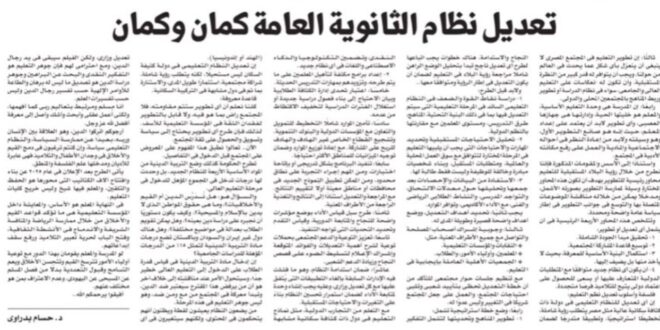Reforming the General Secondary Education System
By Dr. Hossam Badrawi
The state has proposed a project to reform the “General Secondary Education” system under a new name: “The Egyptian Baccalaureate.” The name does not concern me; rather, it is the philosophy of development that matters.
In response to societal inquiries, the Minister of Education invited a group of experts, including former education ministers, some university presidents, deans of education faculties, and me, to discuss the proposed project.
Before delving into the details, I would like to emphasize the following:
Key Principles for Any Educational Policy:
- Education and Learning as Lifelong Processes
Education begins at birth and continues until the end of life. Formal education plays a key role, equipping individuals with essential skills like communication, language, mathematics, arts, computing, self-learning, and behavior development. - Gradual and Calm Development
Reforming education should be gradual and inclusive, involving stakeholders to ensure smooth implementation. However, urgency is required in changing centralized management methods, upgrading educational districts and schools, and refining their responsibilities. - Global Context and Future-Oriented Perspective
Education reform in Egypt must align with global trends and have a future-oriented perspective. It should also reflect on higher education systems and connect curricula with local and international societal needs. - The School as the Foundation
The school is the primary unit of education, the teacher is its core, and its administration serves as its nervous system. Any reform must prioritize teacher preparation, including their social, financial, and moral well-being, to elevate their status in society.
Pillars of Development:
Based on these principles, the proposed educational reform must aim to:
- Achieve comprehensive quality standards.
- Expand community participation.
- Enhance the knowledge infrastructure to add to it rather than deplete it.
- Align with international requirements and seek global accreditation for students.
Philosophy and Approach to Reform:
Reforming an educational system in a densely populated country like Egypt requires a strategic vision, comprehensive planning, and gradual implementation to ensure success and sustainability.
Steps for Effective Reform:
- Analyze the Current Situation:
Examine the strengths and weaknesses of the current system, including infrastructure, curricula, teaching methods, and teacher quality. - Future Needs Assessment:
Identify skills and competencies required to align with both local and global labor markets. Develop proactive, job-creating individuals. - Data-Driven Decisions:
Use statistics on enrollment rates, attendance, extracurricular activities, academic performance, and available resources. - Set Clear Goals:
Define short-term and long-term objectives for the reform process. - Engage Stakeholders:
Involve unions, educational institutions, teachers, parents, students, and NGOs. Hold community dialogues to ensure public support and make society a partner in the process. - Strategic Planning:
- Revise curricula to include critical thinking, AI, and technology.
- Train teachers intensively in modern methods.
- Address student overcrowding and classroom needs.
- Resource Allocation:
- Plan financing in collaboration with international organizations and development banks.
- Encourage private sector participation while prioritizing underserved areas.
- Pilot and Review:
Test the new system in select regions, evaluate results, and refine based on feedback. - Performance Measurement:
Establish clear success indicators and conduct regular evaluations to address challenges. - Community Awareness:
Conduct awareness campaigns to highlight the benefits of reform, using media to share success stories and build public trust. - Ensure Sustainability:
Create a dedicated unit to monitor and maintain system improvements, drawing from international experiences in countries with similar demographics (e.g., India, Indonesia).
The Challenge of Religious Education in the Reform:
The government is also considering making religious education one of the core subjects in the new system, contributing to the final grades required for higher education.
This raises critical questions:
- Should we teach religion or focus on values and ethics?
- How do we accommodate citizens who do not follow Islam or Christianity?
- Is it constitutional to enforce the study of a specific religion?
Globally, very few countries (e.g., Iran, Sudan, Pakistan) include religion as 15% of the grades for university admission. Introducing religious education into this system risks sparking societal conflict. Those opposing it may be labeled as anti-religious, shifting focus from education’s core purpose to divisive debates.
A Call for Rational Reform:
The essence of education lies in critical thinking and evidence-based reasoning, while the essence of religion is belief and obedience. Mixing the two risks undermining both.
Let religious education remain a personal matter, and integrate universal values and ethics through philosophy and logic in the curriculum.
Schools and teachers play a fundamental role in shaping values through sports, arts, cultural activities, and fostering creativity. This approach builds tolerance and acceptance of diversity, moving away from segregating individuals based on religion or differences.
Wake up, and may God guide us all.
 Dr. Hossam Badrawi Official Website
Dr. Hossam Badrawi Official Website


